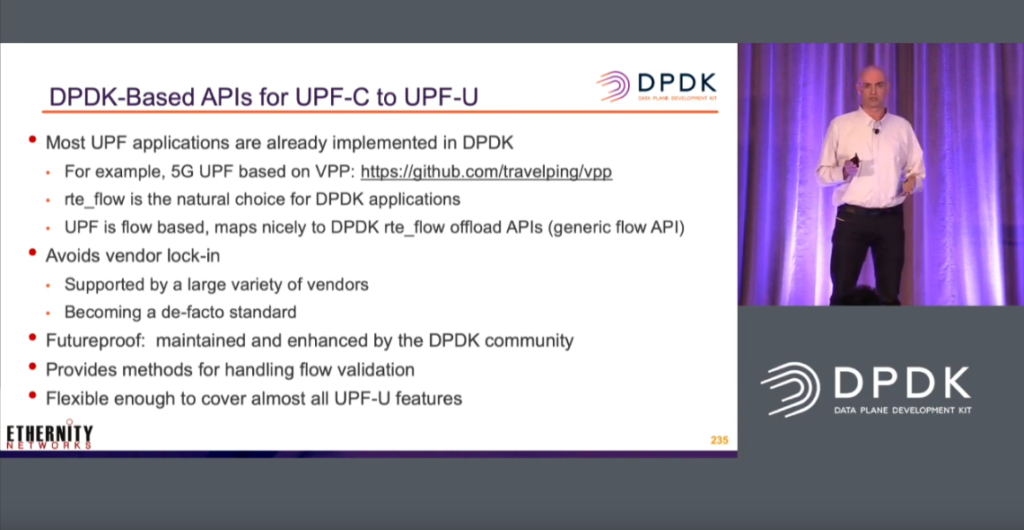
by Brian Klaff
At the annual DPDK Summit North America, Ethernity Networks CTO Barak Perlman was a featured speaker, providing insight into the role DPDK plays in 5G UPF hardware offload.
In fact, 5G was a topic mentioned in a couple presentations at the DPDK Summit this year. While few companies in attendance were as intimately aware of the trends within the telecommunications industry as Ethernity, a few speakers addressed edge virtualization, UPF offload, and/or GTP tunnels, all of which are integral components of a complete 5G deployment.
Barak’s presentation provided both an informative overview of UPF to those who were less familiar and insightful ideas on how UPF offload can be achieved for those who work with FPGA SmartNICs. The main discussion centered around using DPDK hardware offload APIs as the interface between the UPF software and the SmartNIC. This seems to be a natural choice for DPDK users, and yet, this is the first time the topic was formally presented.
Perhaps most relevant to the DPDK community were Barak’s suggested improvements to rte_flow in order to facilitate full UPF offload. Rte_flow was another hot topic at the Summit, with Intel, Mellanox, and Microsoft addressing the benefits and challenges of working with this hardware offload API. Intel presented a good overview of the rte_flow library and discussed the practical implications of using rte_flow for partial or full offload of OVS traffic.
Microsoft brought significant weight to the discussion as an rte_flow user in its cloud environments, and highlighted the fact that rte_flow is the de facto standard for hardware offload, supported by numerous NIC vendors. However, Microsoft spoke of their concern that some APIs might behave differently with different vendors, and suggested ideas for testing and resolving this issue.
Mellanox also spoke of rte_flow in relation to enabling hairpin offloading, in which data never needs to reach the CPU, but rather is entirely processed within the NIC. This was validation of the method that Ethernity suggested in its UPF presentation, offering the same packets-per-second performance with zero CPU involvement compared to the many cores required by partial offload. This allows organizations to Stop Burning CPU Cores!
One more hot topic at the conference was containers, which are rapidly supplanting virtual machines as the go-to technology for embedding applications in a virtual environment. Multiple sessions were devoted to applying DPDK to container applications and scenarios, as well as DPDK’s interplay with Kubernetes, the open source system for orchestrating and managing containers.
Overall, the DPDK Summit was an opportunity for some of the primary companies in the open-source networking world to share their experience and expertise toward improving this primary set of API libraries and drivers for network processing. Ethernity was happy to take an active role in these discussions

